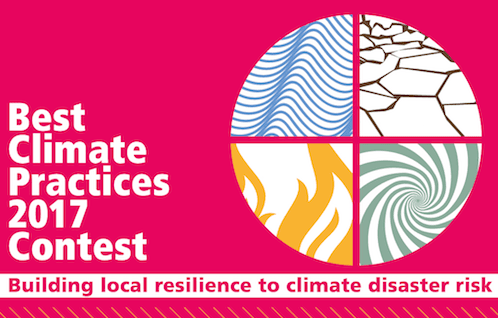The International Center for Climate Governance (ICCG) is pleased to announce the launch of the fifth edition of its Best Climate Practices (BCP) Contest, which this year focuses on the topic of “Building local resilience to climate disaster risk“.
Floods, drought, heat waves and other extreme weather events pose potential losses to persons and communities: losses in life and health, economic damages, displacement, and reduced access to basic needs and services, such as water, food, energy, and education.
Disaster risk reduction (DRR) is the systematic effort to reduce those factors in our societies that amplify the impacts of natural hazards. It includes such actions as building more resilient infrastructures and investing in disaster preparedness and early warning systems, developing new tools such as micro insurances and nature-based solutions, among many others.
Disaster risk reduction, with its aim to strengthen the resilience of communities to all hazards, is an essential piece of the sustainable development agenda.
Out of the 17 Sustainable Development Goals (SDGs) agreed by the United Nations General Assembly in 2015, 10 are strictly tied to the struggle for reducing disaster risk and building resilience.
By choosing the theme of the 2017 Contest, the Best Climate Practices observatory focuses the attention on core aspects of the 2030 Agenda for Sustainable Development – contributing, among others, to Goal 1 (End poverty in all its forms everywhere), Goal 2 (End hunger, achieve food security and improved nutrition and promote sustainable agriculture), Goal 3 (Ensure healthy lives and promote well-being for all at all ages), Goal 11 (Make cities and human settlements inclusive, safe, resilient and sustainable), and Goal 13 (Take urgent action to combat climate change and its impacts).
Disaster Risk Reduction is also the ICCG’s Hot Topic for 2017.
Although efforts are underway, climate change is increasing the frequency and intensity of extreme weather events. Low-income countries and small islands are the most endangered by climate change impacts, but local communities in both cities and rural areas are exposed to disaster risk in the most developed countries as well.
Strategies and actions to cope with climate-related disasters and bounce back quickly are urgently needed. Yet, despite broad recognition that investing in resilience can save lives and money, studies have revealed that only 40 cents of every 100 US dollars spent on international aid is invested in preparedness and measures to reduce disaster risk.
In this context, the 2017 Best Climate Practices Contest aims to award and promote actionable ideas and concrete projects designed to support urban and/or rural communities in preparing and responding to climate disasters, improving local resilience through enhanced preparedness (ex-ante) and/or recovery (ex-post) capacity.
Proposals of existing projects or brand new ideas can be submitted on the Best Climate Practices website from March 13th to May 31st, 2017.
The winner will receive a prize of €3000 to further develop their project or idea.
Submissions will be assessed by an international Panel of Experts and voted on through public online polls.
Discover how to participate by reading the Contest Rules and Procedures and the Best Climate Practices 2017 Call for Proposals.




